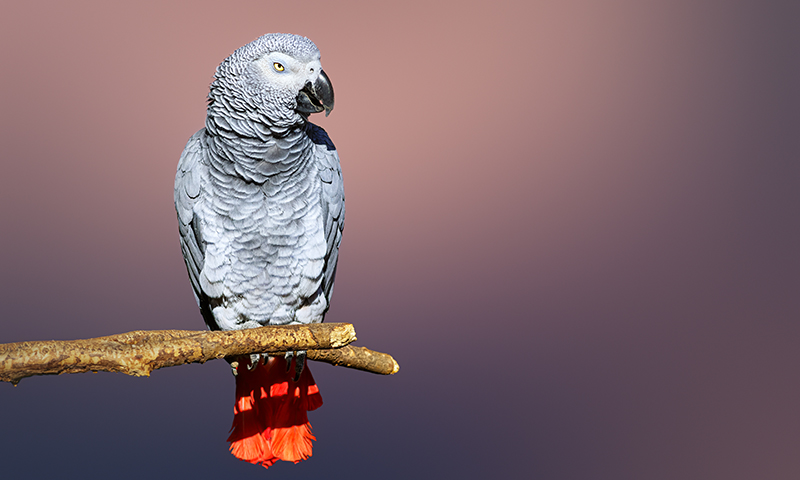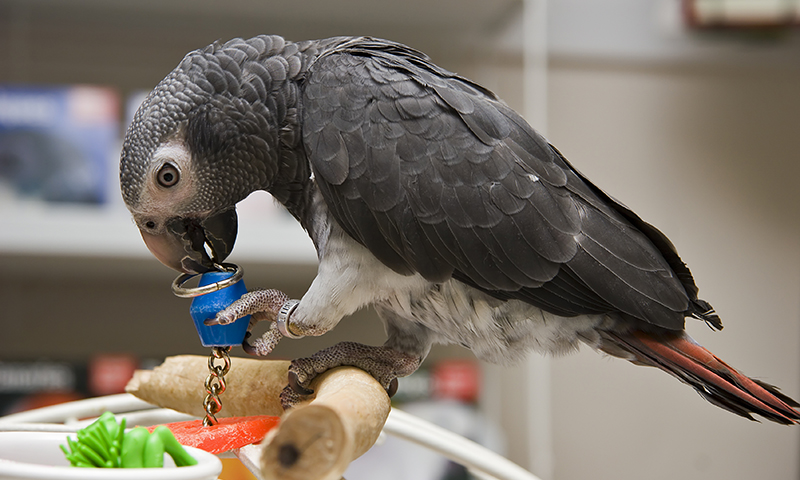Everything You Need to Know About Pet African Greys
If you've ever wished for an ultra-smart pet that can talk to you, consider an African grey parrot. They solve basic problems, mimic your vocabulary, and understand the meaning of words. African grey parrots also have incredible memory skills and full-color vision, making them excellent companions when playing games.
How amazing!
Monika Sangar, co-founder of the Prego Dalliance Sanctuary in California, considers African grey parrots to be one of the most intelligent birds, thanks to their keen observation skills. At her parrot rescue, she provides a loving, safe home and health care for homeless, unwanted, and special needs birds.
Today, she's sharing more about these amazing parrots with us.
What colors are African grey parrots?
As the name suggests, African grey parrots are mostly grey in color.
"African greys are 50 shades of grey," Sanger explained. "There are two different types of African greys, and they do differ a little. Congo African greys are light to medium grey with a bright red tail and a black beak. Timneh African greys are smaller than Congo but darker in color and have a dark maroon tail with an ivory tone upper beak."

A Congo African Grey perched on a branch.
What size are African grey parrots?
Bird enthusiasts consider African grey parrots medium in size. They grow to about one pound in weight and one foot in length. As juveniles mature into adult birds, they gain muscle mass, and their feathers fill in to create beautiful grey plumage.
When it comes to housing an African grey parrot, bigger is better when habitat shopping.
"For African greys, our sanctuary recommends 36" wide x 28" depth with ¾" or ½" bar spacing," Sanger shared. "Ensure their habitat is a secure and comfortable retreat where they feel safe."
You can learn more about creating the perfect home for your African grey parrot in the Bird Housing and Environment guide.
What sounds do African grey parrots make?
African grey parrots love to hear themselves talk. In addition to repeating your words back to you, your pet parrot will also mimic sounds made by other humans in the home and routine sounds they hear, such as alarms or popping and clicking noises.
Don't be surprised when your pet parrot begins singing along to the theme song of your toddler's favorite television show that plays in the home daily.

A Timneh African grey parrot eating a meal.
What do I feed my African grey parrot?
You'll find African grey parrots in the rainforests and savannas of West and Central Africa. In the wilds of Africa, the vegetarian parrots climb up tree trunks and along branches (instead of flying) to find red Cola tragacantha tree berries, other fruits, seeds, and nuts. African grey parrots especially enjoy the outer layer of the oil palm nut and fresh maize straight from the farm fields.
To keep your pet parrot healthy, offer fresh water and food daily.
Consider trying:
-
Kaytee Forti-Diet Pro Health Parrot Food: This blend offers your pet probiotics and prebiotics to support digestive health, Omega 3s for brain and heart health, and antioxidants for immune system wellness. Your African grey parrot will enjoy the mix of sunflower seeds, corn, whole peanuts, pumpkin seeds, and more.
-
Kaytee Exact Rainbow Parrot and Conure Food: Love pelleted food? Each colorful fortified premium food nugget contains the exact nutrition your bird needs for excellent health. There are no seed hulls or shells, which means less waste or mess.
-
Kaytee Fiesta Big Bites Parrot and Conure Food: Formulated for birds with big hooked bills, this mix allows your bird to explore various shapes and textures during mealtime while getting the best nutrition via Omega 3s, antioxidants, probiotics, and prebiotics. Your pet will love the whole corn kernels, shelled peanuts, and a blend of dried produce, including carrots, pineapple, sweet potato, apple, and more.
As pets, African grey parrots are at risk of calcium deficiency. Sangar recommends supplementing their diets with calcium-rich foods such as washed and chopped uncooked kale and broccoli.
"These parrots also love fresh foods, especially berries. To keep them healthy, I suggest offering a variety of colorful fruits and vegetables, incorporating all the colors of the rainbow," Sangar added.
Do African grey parrots like toys?
Yes! Sangar says the African grey parrots at her rescue love shredding cardboard boxes, books, and anything with paper. Of course, your pet should enjoy these "toys" during supervised playtime. Toys are for playing, not eating.
African grey parrots also do well with pine wood toys and parrot toys that make sounds, which adds to their mental and physical health enrichment.
Why not try to make a few toys of your own? Learn how in DIY Parrot Toys You Can Make at Home.
How can I bond with my African grey parrot?
Nurture your relationship with an African grey parrot by spending time with your pet. Allow your bird to approach you on her own terms, respect her space, and let her initiate contact when you're first getting to know one another. This can be as easy as opening the door to her habitat and letting her find her way to you.
Sangar says bonding can take the form of talking to one another, playing games, watching television, making and eating snacks, and offering affection such as holding and petting.
"The more time they spend with you, the stronger your bond will become." Sangar reminds us. "Allow them time outside of their habitat to explore and socialize with you. Play games like peek-a-boo or ball throwing."
You can also offer your parrot a delicious treat, such as the Kaytee Food from the Wild Natural Snack Large Pet Bird filled with a medley of pistachios, bananas, pineapples, bell peppers, chili peppers, and marigold.
Or, maybe your birdie buddy would enjoy some Kaytee Yo Dips Mango Flavored Treats for Large Hookbills. The crunchy nuggets are covered in a delicious fruit-flavored yogurt coating.
"Reward your African grey with their favorite treats and praise when they display good behavior or show interest in bonding activities. Positive reinforcement helps them associate you with positive experiences," Sangar shared.
African Grey Parrots Make Life-long Pets
Between those big, bright eyes and quirky, intelligent personalities, African grey parrots are a popular pet choice among parrot lovers. African greys want to spend time with you, mimicking your words and actions.
"African greys are highly empathetic. They can sense the emotions of their human companions and may mirror those feelings, offering comfort when you're sad," Sangar explained.
If you choose to adopt an African grey, or you're here to learn more about your pet, it's good to know these parrots can live up to 50 years. This means making sure they have a bond with you and younger family members or friends so they have a secondary loving companion if needed in the future.
Sangar suggests putting your pet parrot in your will so your wishes and the animal's needs get met.
Taking the Best Care of Your African Grey Parrot
African greys thrive on routine. Establish a consistent feeding, play, bonding, and bedtime schedule to make your bird feel secure and build trust over time.
Being a pet parent to an African grey parrot offers many rewarding moments. From that first word spoken to you to their comical playtime antics, you're sure to enjoy many laughs with your pet bird.
Learn more about caring for your pet African grey parrot in Bird Health.
